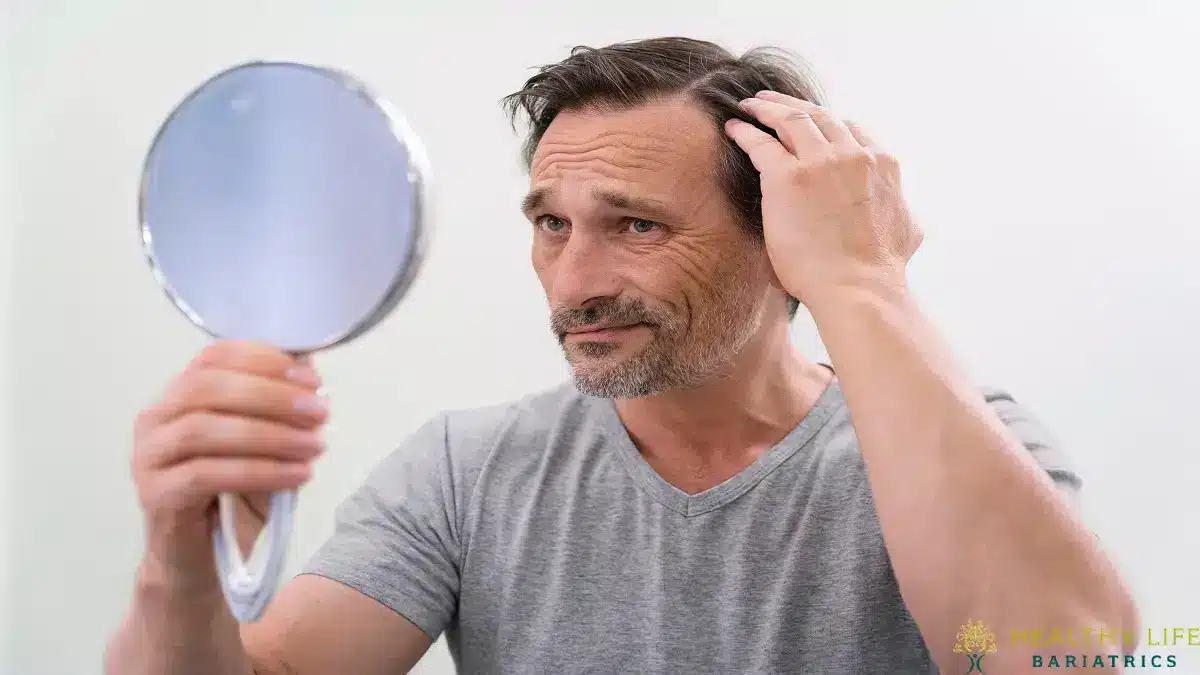Introduction to How Bad is Hair Loss after Gastric Sleeve
Hair loss after gastric sleeve surgery is a common and usually temporary condition that many patients experience. This phenomenon is often attributed to nutritional deficiencies, hormonal changes, and emotional stress during the recovery phase. After surgery, the body undergoes significant adjustments that can affect hair growth cycles.
To mitigate hair loss, it is crucial to prioritize proper nutritional intake and consider supplement use. Key vitamins and minerals, such as biotin, zinc, and protein, play a vital role in hair health. Additionally, emotional well-being should not be overlooked; stress management techniques can help address the psychological impacts of surgery and promote recovery.
Understanding the body's response to gastric sleeve surgery is essential. Adequate preparation, including discussions about potential hair loss and implementing a solid post-operative nutrition plan, can significantly reduce the risks associated with this condition. By being proactive in addressing nutritional needs and emotional health, patients can enhance their recovery and minimize hair loss after surgery.

Hair Loss after Gastric Sleeve
Why Does Hair Loss Happen After Weight Loss Surgery?
Weight loss surgery can be a life-changing procedure that significantly improves an individual's health and quality of life. However, many patients experience an unexpected side effect: hair loss. This phenomenon, often temporary, can be disheartening and lead to concerns about self-image during a transformative journey. Understanding the underlying causes of hair loss after weight loss surgery is essential for patients and healthcare providers alike.
Factors contributing to this issue often include nutritional deficiencies, hormonal changes, and the physical stress of surgery itself. Recognizing these triggers not only provides insight into the process but also emphasizes the importance of proper post-operative care, including a well-balanced diet and nutritional supplementation. By addressing these concerns early on, patients can promote healthier hair growth and ensure their overall well-being during recovery.
What's a Normal Amount of Hair to Lose?
On average, humans shed between 50 to 100 hairs daily, a natural part of the hair growth cycle. However, individuals experiencing telogen effluvium may notice more significant hair loss, with an increase of up to 15% of their hair volume during distressing periods.
Several factors can influence hair loss, including stressors such as major surgery and hormonal disruptions. Bariatric surgeries, like sleeve gastrectomy, can lead to nutritional deficiencies that further exacerbate hair thinning or loss. It’s important to address these deficiencies through dietary adjustments or supplements to support healthy hair growth.
If you're experiencing concerning or persistent hair loss, it’s essential to consult a doctor. Early intervention can help identify underlying causes and guide appropriate treatment strategies. Remember, while some daily shedding is normal, significant changes in hair loss warrant professional advice.
Can You Prevent Losing Hair After Bariatric Surgery?
Bariatric surgery can be a transformative procedure for individuals struggling with obesity, leading to significant weight loss and improved health outcomes. However, one common concern that arises post-surgery is hair loss, a condition experienced by many patients due to various factors such as nutritional deficiencies, rapid weight loss, and hormonal changes. Understanding the underlying causes of hair loss after bariatric surgery is crucial for patients as they navigate their recovery journey.
This guide will explore preventive measures and strategies that can be implemented to minimize hair loss, ensuring that individuals not only achieve their weight loss goals but also maintain their physical appearance and self-esteem. By incorporating tailored nutritional plans, proper supplementation, and lifestyle adjustments, patients can effectively address this issue and promote healthier hair growth post-surgery.
Keep hydrated
Hydration is crucial after bariatric surgery for optimal recovery and overall health. Staying adequately hydrated supports wound healing, ensuring that your body repairs itself efficiently after surgery. Moreover, proper hydration can minimize hair loss, a common concern during the recovery phase due to nutritional deficiencies.
To meet your fluid goals, aim to drink at least 2 liters of water daily. Consider keeping a reusable water bottle with you to track your intake. It’s essential to avoid high-calorie beverages, such as soft drinks and sugary juices, which can hinder your weight loss progress and contribute to hydration issues.
Dehydration is the leading cause of hospital re-admissions following weight loss surgery, so prioritizing hydration is vital. Make hydration a part of your daily routine by sipping fluids throughout the day, opting for herbal teas or flavored water for variety, and setting reminders to drink. By focusing on staying hydrated, you can enhance your recovery experience and support your long-term health goals after bariatric surgery.

Take bariatric vitamins
Take your bariatric vitamins
After bariatric surgery, taking bariatric vitamins is crucial to prevent hair loss and maintain overall health. These specialized supplements are formulated with higher doses of essential nutrients, particularly iron and B vitamins, which are vital for hair health and energy levels. Without adequate supplementation, patients, especially those who have undergone gastric bypass and duodenal switch procedures, may experience significant hair loss due to nutrient deficiencies.
Consistent nutrient intake is essential post-operative care, as the body’s ability to absorb vitamins and minerals changes significantly after surgery. Gastric sleeve patients should commit to this regimen for at least two years post-operatively to support their recovery and prevent complications.
Incorporating bariatric vitamins into your daily routine not only aids in retaining hair but also bolsters overall wellness, ensuring that your body receives the crucial nutrients it needs during this transformative time. Prioritizing these supplements helps ensure a successful recovery and long-term health outcomes. Make sure to discuss the best options with your healthcare provider to tailor your vitamin regimen effectively.
Will My Hair Return Back to Normal?
Following bariatric surgery, many individuals experience hair loss, primarily due to a condition known as telogen effluvium. This temporary hair loss generally begins around three months post-surgery and can last for about six months. After this period, typical hair regrowth usually resumes, with hair gradually returning to normal over time.
It’s essential to recognize that this hair loss is a common reaction to the stress of surgery and changes in dietary habits, and it is typically not life-threatening. However, if hair loss persists beyond six months or is accompanied by other concerning symptoms, it’s advisable to seek a consultation with a doctor.
In the meantime, incorporating vitamin supplements may help support hair health and overall recovery during this transitional phase. Remember, while hair regrowth is a normal part of the healing process, your healthcare provider can offer tailored advice to ensure optimal recovery.
What to Do About Hair Loss after Gastric Sleeve Surgery
After gastric sleeve surgery, managing hair loss is crucial. One of the most effective ways to combat this issue is to maintain a high-protein diet. Protein is vital for hair health, so incorporate sources like lean meats, fish, eggs, dairy products, legumes, and tofu into your meals. Aim for at least 60-80 grams of protein daily to support hair growth.
Additionally, taking recommended bariatric vitamins is essential. Focus on vitamins such as Biotin, which promotes hair growth, and Vitamin D, which helps in hair follicle cycling. Consult your healthcare provider for specific supplementation recommendations tailored to your needs.
Lastly, managing emotional stress is vital, as stress can exacerbate hair loss. Engage in activities that promote relaxation, such as yoga, mindfulness, or hobbies that bring you joy. By focusing on a high-protein diet, taking bariatric vitamins, and managing emotional stress, you can effectively address hair loss after gastric sleeve surgery and support overall well-being.
How long does the hair loss last for?
Hair loss can be a distressing experience for many individuals, influenced by various factors such as genetics, health conditions, hormonal changes, and lifestyle choices. Understanding the duration of hair loss is crucial as it varies from person to person and depends on the underlying cause.
Some may experience temporary shedding due to stress or illness, which can resolve within a few months, while others may face chronic conditions that lead to prolonged hair thinning or baldness. In this guide, we will explore the different types of hair loss, their expected durations, and the factors that can influence recovery time, providing clarity for those seeking to understand their own hair loss journey.
Eat a Nutritious Diet
A nutritious diet is crucial after bariatric surgery to support healing and prevent complications such as hair loss. Patients should aim for 60 to 80 grams of protein daily, as protein is vital for tissue repair and overall health. Including nutrient-rich foods like lean meats, legumes, and dairy can enhance recovery while also supporting healthy hair follicles.
In the post-surgery phase, vitamin supplements can be particularly beneficial to address potential deficiencies in potassium, zinc, and iron—all essential for hair health. Zinc, for example, plays a crucial role in hair growth, while iron is necessary for delivering oxygen to hair follicles.
A balanced diet rich in vitamins and minerals not only maintains overall health but also promotes robust hair growth. Nevertheless, it’s essential to consult a healthcare provider before making any dietary changes to ensure that individual nutritional needs are met, preventing any adverse effects post-surgery. Prioritizing a nutritious diet supplemented adequately is vital for long-term success after bariatric surgery and for maintaining vibrant hair health.

Hair Return Back to Normal after gastric sleeve
Try Minoxidil
Minoxidil is an FDA-approved topical treatment designed to combat hair loss, available in both liquid and foam forms. This effective product stimulates hair follicles and enhances blood flow to the scalp, promoting hair growth in those experiencing thinning or baldness. Sold over-the-counter under the brand name Rogaine, Minoxidil has become a popular choice for individuals seeking to rejuvenate their hair.
For optimal results, Minoxidil works best when combined with finasteride, another proven treatment for hair loss. The combination addresses different aspects of hair loss, making it more effective for many users. While Minoxidil focuses on revitalizing hair follicles and supporting blood circulation, finasteride targets hormone levels that can contribute to hair thinning.
If you're looking to improve your hair growth journey, consider trying Minoxidil along with finasteride for the best possible results. Rogaine offers an accessible and reliable solution to restore your confidence and enhance your appearance.
Opt for a Hair Loss Shampoo
If you're dealing with hair loss, opting for an effective hair loss shampoo can make a significant difference. Hims' thickening shampoo infused with saw palmetto is a noteworthy choice, as it’s known for its potential to reduce hair loss by blocking DHT, a hormone that contributes to baldness.
While many recommend minoxidil for hair regrowth, it may not be ideal for individuals experiencing hair loss after bariatric surgery. This is due to the delayed effects of minoxidil and the temporary nature of telogen effluvium, a condition where hair follicles enter a resting phase after physical stress.
In the meantime, using a volumizing shampoo can be a smart strategy to mask thinning hair, giving your locks a fuller appearance until recovery occurs. These shampoos can add body and texture, helping you feel more confident while you explore treatment options. Whether you're looking to combat hair loss or enhance volume, choose products tailored to your needs for the best results.
Consider Biotin
Biotin, a vital B-vitamin, offers numerous benefits for hair health, primarily promoting healthy hair growth and preventing dryness. By supporting the production of keratin, a key protein in hair structure, biotin helps enhance hair strength and shine, reducing the risk of breakage.
Combining biotin with silica can be particularly effective in preventing hair thinning and restoring hair after phases of shedding. Silica complements biotin by promoting collagen production, which further supports hair follicles and boosts overall hair vitality.
Dietary sources of biotin include eggs, nuts, seeds, and leafy greens, making it relatively easy to incorporate into a balanced diet. However, for those with dietary restrictions, biotin supplements are widely available. It is essential to consult with a healthcare provider before starting any new supplement to ensure it aligns with individual health needs.
By considering biotin and silica in your hair care regimen, you can combat hair loss, enhance hair growth, and maintain overall hair health, achieving a vibrant and resilient mane.
Topical Finasteride
Topical Finasteride presents a less overwhelming alternative to traditional oral finasteride for those seeking to combat male pattern hair loss. This innovative treatment targets hair loss directly at the scalp, minimizing systemic exposure and potential side effects associated with oral medications. When combined with minoxidil in a convenient spray formulation, Topical Finasteride has been shown in clinical trials to yield improved results, making it a powerful option for individuals struggling with hair thinning.
What sets this duo apart is its FDA approval, underscoring its safety and effectiveness as a treatment choice. The combination of Topical Finasteride and minoxidil not only helps to inhibit DHT—an influential factor in hair loss—but also promotes hair regrowth through minoxidil's vasodilating properties.
With this FDA-approved formulation, users can look forward to a dual-action approach that enhances hair regrowth, providing hope and renewed confidence for those affected by male pattern hair loss. Embrace the benefits of Topical Finasteride and experience a comprehensive solution to reclaiming your hair.

Finasteride & Minoxidil after Gastric Sleeve
Finasteride & Minoxidil
Using finasteride and minoxidil together is a powerful strategy for optimal hair regrowth, particularly in the treatment of pattern hair loss. Both are FDA-approved treatments, and clinical trials have shown that their combined use yields improved outcomes compared to either treatment alone.
Minoxidil, available in liquid and foam formulations, works by stimulating hair follicles and increasing blood flow to the scalp, which significantly aids in hair growth. This vasodilating effect helps revitalize dormant hair follicles, enhancing the overall health and density of hair.
Finasteride, on the other hand, addresses hair loss at the hormonal level by inhibiting the conversion of testosterone to dihydrotestosterone (DHT), a key factor in pattern hair loss for both men and women. Together, these treatments offer a comprehensive approach to combating hair loss.
Their effectiveness is well-documented, making finasteride and minoxidil an ideal combination for those seeking to restore their hair and confidence. With backing from extensive clinical research, this duo remains a leading choice for anyone facing the challenges of pattern hair loss.
How Bad is Hair Loss after Gastric Sleeve Summary
In conclusion, hair loss after gastric sleeve surgery typically affects 30% to 40% of patients but is usually a temporary condition. This phenomenon can be distressing, but it is often a transient side effect of significant changes occurring in the body.
The underlying factors contributing to hair loss include changes in nutrition due to dietary restrictions, hormonal shifts from rapid weight loss, and emotional stress related to the surgical journey. Nutritional deficiencies, particularly in protein, iron, and various vitamins, can exacerbate hair thinning. Therefore, proper nutrient intake and supplementation are crucial during recovery to support hair health.
Patients can be reassured that, with adherence to their surgeon’s guidance and focus on maintaining a balanced diet, regrowth is highly likely. By prioritizing nutrition and emotional well-being, individuals can optimize their recovery and minimize hair loss, making it a manageable aspect of the post-operative experience.





